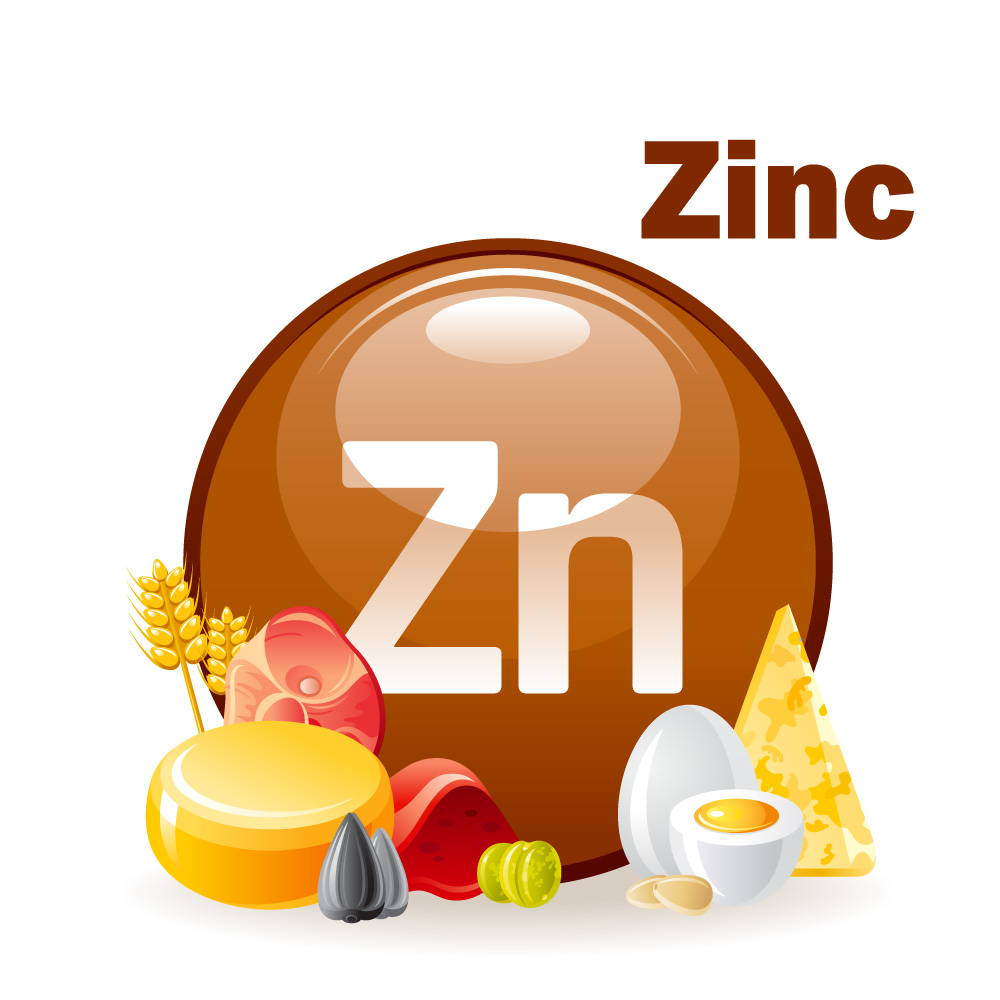SUPPLEMENT - MINERALS
Explore our effective micro-nutrients and premium ingredients

What is zinc and what does it do?
How much zinc do I need?
LifeStage | RecommendedAmount |
Birth to 6 months | 2 mg |
Infants 7–12 months | 3 mg |
Children 1–3 years | 3 mg |
Children 4–8 years | 5 mg |
Children 9–13 years | 8 mg |
Teens 14–18 years (boys) | 11 mg |
Teens 14–18 years (girls) | 9 mg |
Adults (men) | 11 mg |
Adults (women) | 8 mg |
Pregnant teens | 12 mg |
Pregnant women | 11 mg |
Breastfeeding teens | 13 mg |
Breastfeeding women | 12 mg |
What happens if I don’t get enough zinc ?
What are some effects of zinc on health?
Immune system
and wound healing
The body’s immune system needs zinc to do its job. Older people and children in developing countries who have low levels of zinc might have a higher risk of getting pneumonia and other infections. Zinc also helps the skin stay healthy. Some people who have skin ulcers might benefit from zinc dietary supplements, but only if they have low levels of zinc.
Age-related macular
degeneration (AMD)
AMD is an eye disease that gradually causes vision loss. Research suggests that zinc might help slow AMD progression. In a large study among older people with AMD who were at high risk of developing advanced AMD, those who took a daily dietary supplement with 80 mg zinc, 500 mg vitamin C, 400 IU vitamin E, 15 mg beta-carotene, and 2 mg copper for about 6 years had a lower chance of developing advanced AMD and less vision loss than those who did not take the dietary supplement. In the same study, people at high risk of the disease who took dietary supplements containing only zinc also had a lower risk of getting advanced AMD than those who did not take zinc dietary supplements. People who have or are developing the disease might want to talk with their doctor about taking dietary supplements.
Diarrhea
Children in developing countries often die from diarrhea. Studies show that zinc dietary supplements help reduce the symptoms and duration of diarrhea in these children, many of whom are zinc deficient or otherwise malnourished. The World Health Organization and UNICEF recommend that children with diarrhea take zinc for 10–14 days (20 mg/day, or 10 mg/day for infants under 6 months). It is not clear whether zinc dietary supplements can help treat diarrhea in children who get enough zinc, such as most children in the United States.
The common cold
Some studies suggest that zinc lozenges or syrup (but not zinc dietary supplements in pill form) help speed recovery from the common cold and reduce its symptoms if taken within 24 hours of coming down with a cold. However, more study is needed to determine the best dose and form of zinc, as well as how long it should be taken before zinc can be recommended as a treatment for the common cold.
Can zinc be harmful?
Where can I find out more about zinc?
References
1. Sandstead HH. Understanding zinc: recent observations and interpretations. J Lab Clin Med 1994;124:322-7. [PubMed abstract]
2. Institute of Medicine, Food and Nutrition Board. Dietary Reference Intakes for Vitamin A, Vitamin K, Arsenic, Boron, Chromium, Copper, Iodine, Iron, Manganese, Molybdenum, Nickel, Silicon, Vanadium, and Zinc . Washington, DC: National Academy Press, 2001.
3. Solomons NW. Mild human zinc deficiency produces an imbalance between cell-mediated and humoral immunity. Nutr Rev 1998;56:27-8. [PubMed abstract]
4. Prasad AS. Zinc: an overview. Nutrition 1995;11:93-9. [PubMed abstract]
5. Heyneman CA. Zinc deficiency and taste disorders. Ann Pharmacother 1996;30:186-7. [PubMed abstract]
6. Simmer K, Thompson RP. Zinc in the fetus and newborn. Acta Paediatr Scand Suppl 1985;319:158-63. [PubMed abstract]
7. Fabris N, Mocchegiani E. Zinc, human diseases and aging. Aging (Milano) 1995;7:77-93. [PubMed abstract]
8. Maret W, Sandstead HH. Zinc requirements and the risks and benefits of zinc supplementation. J Trace Elem Med Biol 2006;20:3-18. [PubMed abstract]
9. Prasad AS, Beck FW, Grabowski SM, Kaplan J, Mathog RH. Zinc deficiency: changes in cytokine production and T-cell subpopulations in patients with head and neck cancer and in noncancer subjects. Proc Assoc Am Physicians 1997;109:68-77. [PubMed abstract]
10. Rink L, Gabriel P. Zinc and the immune system. Proc Nutr Soc 2000;59:541-52. [PubMed abstract]
11. Health information data from U.S. National Institutes of Health
Better than others
Nine medical doctors used their research findings to develop Dr’s Grow UP in the biotech lab. The result is a product containing 22 ingredients mixed in the perfect proportions to maximize bone health and height development.
Why Bone Science?
Science-Backed Formulations
Carrying out extensive research and keeping up-to-date with the latest scientific findings is our key to develop superior formulations.
Best Growth Support for Kids & Teenagers
Our products contain essential ingredients for a healthy bone and height development of kids from 10 years and teenagers.
Fighting Aging Effects
We are dedicated to create formulations that delay and restrict the extent of adult’s bone density decrease.
Unmatched Product Quality
Only 100% natural ingredients that contain no soy, no gluten, no GMOs, no maltodextrin, and no artificial flavors, colors, or preservatives.
Product Safety
All of our products are manufactured in the US in an FDA and NSF cGMP registered facility.
